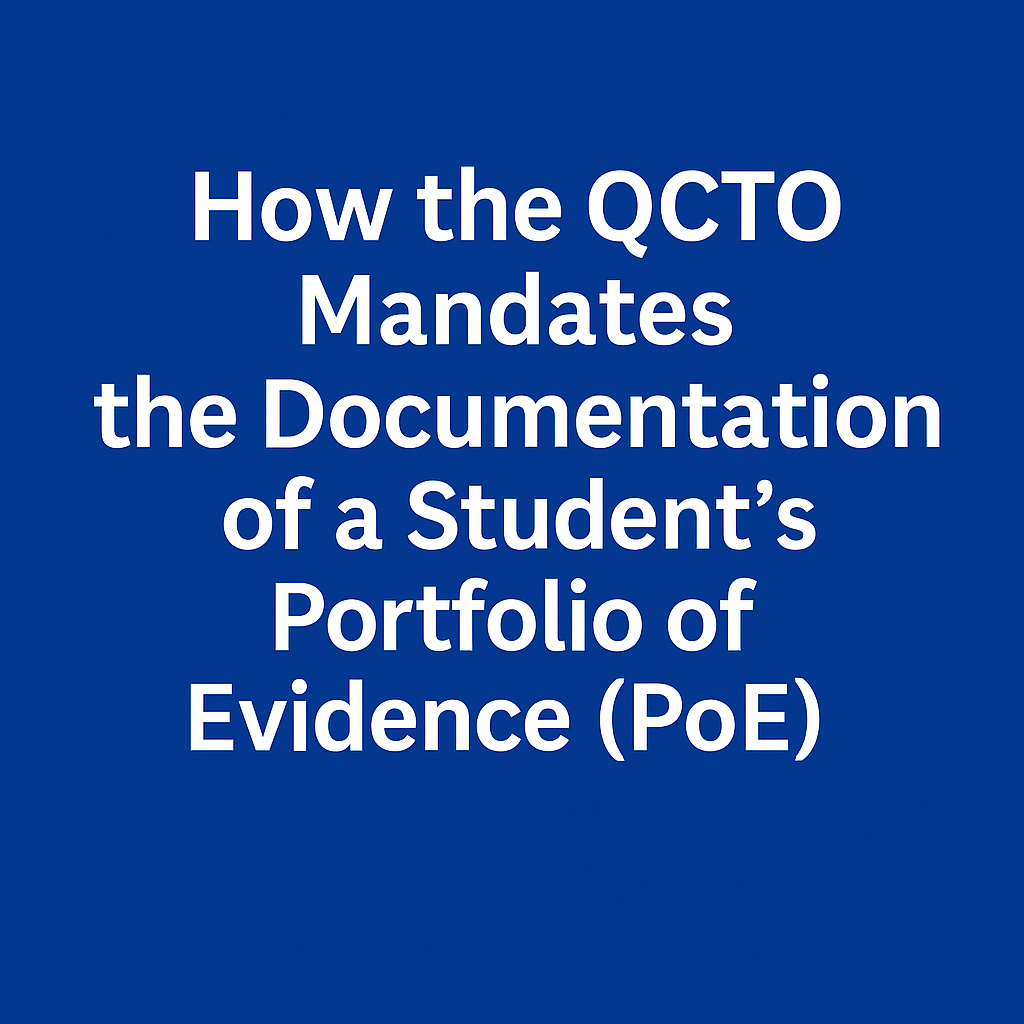How the QCTO Mandates the Documentation of a Student’s Portfolio of Evidence (PoE)

As South Africa transitions fully from SAQA to QCTO, training providers must align their practices with the new compliance standards. One critical area is how a learner’s Portfolio of Evidence (PoE) is compiled, stored, and submitted.
The Quality Council for Trades and Occupations (QCTO) has introduced structured, outcome-based expectations for PoEs — and if you’re still using paper files or inconsistent formats, you could be at risk of non-compliance.
Here’s what you need to know.
What Is a PoE?
A Portfolio of Evidence (PoE) is a collection of documents that proves a learner has acquired the knowledge, skills, and workplace experience required to be declared competent in a qualification or part qualification.
Under QCTO, a PoE is not just a record — it is the official learner file required for assessment, verification, and certification.
QCTO’s Mandated PoE Requirements
QCTO requires that PoEs be:
Structured and Standardised
Every PoE must follow a nationally recognized format that includes:
- Assessment plans
- Formative assessment evidence
- Summative assessments
- Workplace evidence (logbooks, checklists, observations)
- Moderator and assessor reports
No more varied templates per provider — consistency is key.
Compliant with Curriculum Components
The PoE must reflect the three components of the occupational qualification:
- Knowledge component – theory-based learning
- Practical component – simulated work
- Workplace component – real-world application, logged and signed
Each component must be clearly documented and aligned to outcomes in the Curriculum Document (CD) and Assessment Specification Document (ASD).
Signed, Verified, and Authenticated
All entries must be:
- Verified by supervisors or workplace coaches
- Assessed and signed by a registered assessor
- Moderated as per QCTO quality assurance guidelines
QCTO is particularly strict on authenticity and traceability, especially for workplace evidence.
Digitally Accessible (Strongly Recommended)
While not yet mandatory, QCTO and SDPs are increasingly moving toward digitally managed PoEs, especially for remote moderation and verification.
A digital system like CloudPOE helps providers:
- Store PoEs securely in the cloud
- Allow real-time logbook entries
- Automate PoE compilation
- Generate PoE reports in QCTO-ready formats
The Risks of Non-Compliance
Providers who don’t comply with QCTO PoE requirements risk:
- Qualification delays for learners
- Failed internal or external moderation
- Rejection during verification by QCTO
- Revoked accreditation status
CloudPOE Helps You Stay Compliant — Effortlessly
At CloudPOE, we understand the complexity of QCTO PoE documentation. Our platform:
- Digitizes logbooks and assessments
- Tracks all PoE components across learning sites
- Provides role-based access for assessors and moderators
- Generates complete, standardized PoE files in minutes
📅 Final Thoughts
The future of occupational training in South Africa is digital, standardized, and outcome-based — and your PoEs must reflect that.
Are your learners QCTO-ready?
Is your PoE process structured, compliant, and secure?
👉 Let CloudPOE help you meet every QCTO standard with ease. Book a demo today


